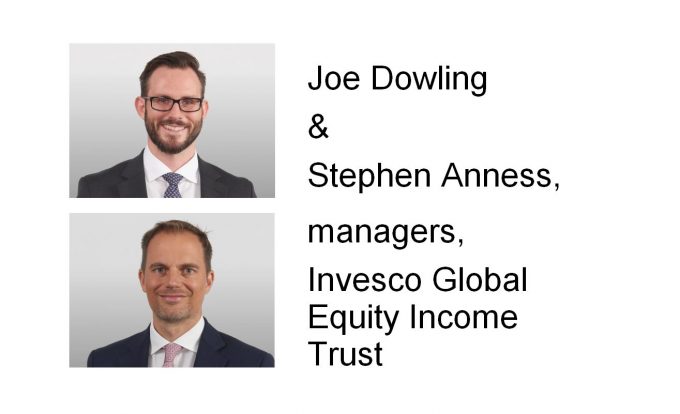Invesco Global Equity Income results for the 12 months ended 31 May 2024 show it marginally behind its MSCI World Index benchmark, returning 21.0% to the index’s 21.6%. However, a narrowing discount did help the shares to a 26.9% return.
The period end came just after the 7 May conclusion of the merger of the various sub-classes of shares in Invesco Select into the global equity income share class.
The fund is an AIC ‘Next Generation Dividend Hero’, with 14 consecutive years of dividend increases. The total dividend for the year was 7.35p. The new policy is to pay an annual dividend of at least 4%, calculated on the unaudited year-end NAV, paid quarterly in equal amounts, thus giving a smoother, more predictable and enhanced income to shareholders. The intention is that these dividends will be paid from revenues and, if required, capital reserves. The unaudited year-end NAV was 313.30p; accordingly the first interim dividend, in respect of the year ending May 2025, of 3.13p was paid on 15 August 2024. This represents a projected annualised total dividend of 12.52p per share, which amounts to an increase of at least 70% over the annual dividend that was paid to shareholders of any share class for the year ending 31 May 2024.
So far in the current financial year ending May 2025, 57,000 shares have been repurchased, and placed in treasury, at an average price of 285.79p. No shares have been issued in the present year.
There will be a continuation vote in February 2026.
Extracts from the manager’s report
Q What have been some of the biggest contributors?
A Rolls Royce. The turnaround continues at Rolls Royce: flying hours are recovering and cost control remains excellent. The company is well positioned with a strong recurring revenue stream in a growing and duopolistic market.
3i Group continues to benefit from the very strong performance of its main underlying portfolio company, Action, a European discount retailer. Though we have taken some profits and reduced our exposure, the stock remains the portfolio’s largest holding as we continue to see a long runway for growth.
Broadcom delivered strong results supported by accelerating demand for its custom AI semiconductor chips combined with the early benefits derived from its acquisition of VM Ware. We have since reduced our position size to reflect the significant valuation re-rating in the shares.
KKR has performed really well over the period following a series of earnings beats. Though we have reduced some of our exposure this year following the sharp rally in 2023, it remains in the portfolio as a core holding as we think the business should continue to deliver above average growth and improvement in margins.
Progressive. The business continues to take market share (with price increases). They are using their technology advantage to great effect by giving consumers low prices and advertising with high return on investments.
Q And detractors?
A Nvidia shares have rallied sharply in the previous 12 months which has been a headwind to relative performance since we do not own the stock. As readers of our previous updates will know we bought Nvidia in the summer of 2022 following a sharp selloff and then subsequently sold in March 2023, after the share price had more than doubled. In hindsight it is easy to say we were too early in selling but we followed our process and stuck to our valuation discipline. Today, we remain hesitant to buy back into the shares as investor expectations are high and the valuation multiple leaves limited room for error, as we have more recently seen.
AIA group. We have undergone a review of this holding to ensure the investment story remains intact and that there has not been a thesis change. Part of the underperformance appears to be related to the accounting move to IFRS 17, rather than any cracks appearing in AIA’s economic moats. We have maintained our exposure.
Azelis. A mid-cap specialty chemicals manufacturer has struggled of late as the cyclical recovery story has been pushed out. The share price came under further pressure when a large shareholder disposed of their holding. We have reviewed the thesis, met management and even conducted a visit to one of their research sites and remain confident in the long term prospects of the business.
Inwit has struggled in the ‘higher for longer’ interest rate environment due to the nature of its balance sheet, i.e., it is highly leveraged. We like the business for its relatively defensive earnings power and the diversification role it plays from a portfolio construction perspective (should benefit when monetary policy begins to ease).
Reckitt Benckiser. When we started the buying the stock a year ago, we regarded it as a ‘cheap defensive’ with an attractive yield that would benefit from an improvement in some of its key brands and better management execution. Unfortunately, recent results have shown this not to be the case. We have sold our position and we put this down to a thesis break and quickly moved on.
IGET : Invesco Global Equity marginally behind benchmark in year of restructuring
